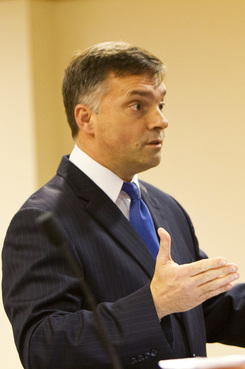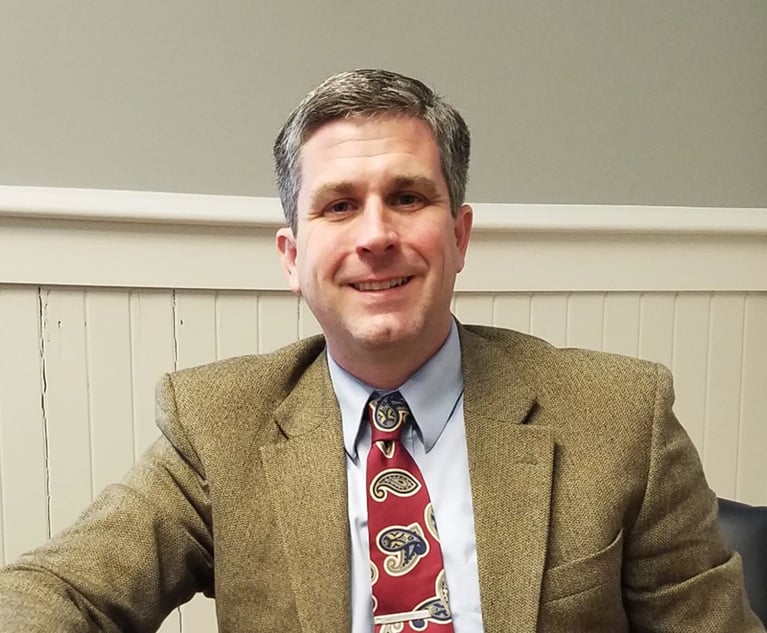DeKalb DA Won't Prosecute Violations of New Abortion Law
Sherry Boston says the law could allow prosecution of women for seeking abortions—but district attorneys in Cobb and Gwinnett counties disagree.
May 16, 2019 at 06:37 PM
6 minute read
 Sherry Boston, DeKalb County district attorney. Photo: John Disney/ALM
Sherry Boston, DeKalb County district attorney. Photo: John Disney/ALM
Sherry Boston, the DeKalb County district attorney, said Thursday she will not prosecute anyone under Georgia's new law criminalizing abortion after a woman is about six weeks pregnant.
“I believe it is a woman's right to make decisions regarding her own body and medical care, including, but not limited to, seeking an abortion, as upheld by the United States Supreme Court,” Boston said in a statement to the Daily Report.
The newspaper had asked five district attorneys in the Atlanta area whether the new law, which takes effect Jan. 1, allowed prosecution of women for seeking abortions. Criminal defense lawyers came to opposite conclusions on that subject in competing columns in the Daily Report this week.
District attorneys in Gwinnett and Cobb counties said they could not prosecute women seeking abortions but that abortion providers clearly could be pursued for violating the law.
“I don't think it's legally possible” to prosecute women under the new law, Gwinnett County District Attorney Danny Porter said Wednesday.
 Gwinnett County DA Danny Porter. Photo: Stephanie Wilson/ State Bar of Georgia
Gwinnett County DA Danny Porter. Photo: Stephanie Wilson/ State Bar of GeorgiaJohn Melvin, the acting district attorney in Cobb County, wrote in an email that under case law and the statutory language of House Bill 481, “liability would potentially lie with doctors, nurses, midwifes or pharmacists who perform abortions”—but not with the women who obtained abortions.
A spokesman for Fulton County District Attorney Paul Howard said “he would not prosecute women under the new law” but did not elaborate on his reasoning.
Clayton County District Attorney Tracy Graham Lawson was in court Thursday and did not have time to discuss the new law.
The 8,000-member Medical Association of Georgia opposed the bill, arguing in a March letter to a state senator that the bill “criminalizes physicians and creates a private right of action against physicians when physicians care for their patients within their scope of practice.”
The association also said the bill “could undermine efforts to recruit and retain OB-GYN in Georgia, and could further restrict access to health care in rural Georgia.”
Critics, who note that six weeks pregnant is only about two weeks after a woman would miss her period, promised a lawsuit to challenge the law for violating women's privacy rights identified in the Roe v. Wade decision from the U.S. Supreme Court in 1973. Gov. Brian Kemp said when he signed the bill into law, “All life matters, and all life is worthy of protection.”
Why Women Could Be Prosecuted
State Sen. Jen Jordan, D-Atlanta, drew national attention for her opposition to the bill. In a recent interview with Slate, she noted the bill says women who are prosecuted for undergoing an abortion may argue in court that they “reasonably believed that an abortion was the only way to prevent a medical emergency.”
“It's Criminal Law 101 that you don't need an affirmative defense from criminal prosecution if there is no intent to criminally prosecute someone,” Jordan told Slate. “The inclusion of that affirmative defense is the clearest intent that we have that this was exactly what the Republicans are trying to do.”
Andrew Fleischman, a criminal defense appellate attorney at Ross & Pines in Atlanta, argued in an opinion piece in the Daily Report that the law's expansion of the definition of a “person” to include fetuses with a heartbeat means women could be prosecuted for murder for undergoing an abortion.
“Even people who leave the state to get an abortion may not be exempt because, when you form an agreement to kill a human being and then take substantial steps to do it (like packing your bags and contacting an out-of-state clinic), you have completed the crime of conspiracy to commit murder,” Fleischman wrote.
Why Women Couldn't Be Prosecuted
 John Melvin, acting district attorney in Cobb County. Photo: John Disney/ALM
John Melvin, acting district attorney in Cobb County. Photo: John Disney/ALMPorter, Gwinnett's district attorney, said Wednesday that a woman couldn't be prosecuted for traveling from Georgia to a state where abortion is legal, adding, “I don't know how to establish criminal intent” for those facts.
Matthew Cavedon, a criminal defense attorney in Gainesville, wrote in response to Fleischman that HB 481's defining unborn children to be included in “personhood” was not a “sea change in criminal law.”
“First, note the criminal statutes that are not even arguably changed by HB 481. The law against assaulting an unborn child specifically says that it does not apply to 'conduct relating to an abortion,' or to 'any woman with respect to her unborn child.'”
Melvin, from Cobb County, credited Cavedon's points and added that a woman cannot be subject to felony murder due to an abortion.
Felony murder “applies when someone commits a certain kind of felony and someone else dies in the course of it,” he wrote. “The intent to commit the underlying felony is 'transferred' to the killing. Since women cannot be charged with the underlying felony of abortion there is no 'intent' to transfer.”
'Ambiguity and Constitutional Concerns'
Boston said doctors, nurses, anesthetists, health care providers, office receptionists—”virtually anyone who either performs or assists in performing or arranging what is currently a legal medical procedure—could potentially be charged under this statute.”
“The bill does not specifically exclude the woman receiving an abortion from criminal liability,” Boston added. “This could have been easily accomplished by inserting a sentence in this law or by amending other statutes, such as Murder, O.C.G.A. sec. 16-5-1, to address HB 481. While analysis of case law and other statutes, such as Feticide, O.C.G.A. sec. 16-5-80, seems to make clear that a woman cannot be prosecuted for obtaining an abortion, this new law muddies the water and may open the door for this type of prosecution. ”
“ As district attorney with charging discretion, I will not prosecute individuals pursuant to HB 481 given its ambiguity and constitutional concerns,” Boston concluded. “As a woman and mother, I am concerned about the passage and attempted passage of laws such as this one in Georgia, Alabama, and other states.”
This content has been archived. It is available through our partners, LexisNexis® and Bloomberg Law.
To view this content, please continue to their sites.
Not a Lexis Subscriber?
Subscribe Now
Not a Bloomberg Law Subscriber?
Subscribe Now
NOT FOR REPRINT
© 2025 ALM Global, LLC, All Rights Reserved. Request academic re-use from www.copyright.com. All other uses, submit a request to [email protected]. For more information visit Asset & Logo Licensing.
You Might Like
View All

DC Lawsuits Seek to Prevent Mass Firings and Public Naming of FBI Agents
3 minute read

Apply Now: Superior Court Judge Sought for Mountain Judicial Circuit Bench
3 minute readTrending Stories
Who Got The Work
J. Brugh Lower of Gibbons has entered an appearance for industrial equipment supplier Devco Corporation in a pending trademark infringement lawsuit. The suit, accusing the defendant of selling knock-off Graco products, was filed Dec. 18 in New Jersey District Court by Rivkin Radler on behalf of Graco Inc. and Graco Minnesota. The case, assigned to U.S. District Judge Zahid N. Quraishi, is 3:24-cv-11294, Graco Inc. et al v. Devco Corporation.
Who Got The Work
Rebecca Maller-Stein and Kent A. Yalowitz of Arnold & Porter Kaye Scholer have entered their appearances for Hanaco Venture Capital and its executives, Lior Prosor and David Frankel, in a pending securities lawsuit. The action, filed on Dec. 24 in New York Southern District Court by Zell, Aron & Co. on behalf of Goldeneye Advisors, accuses the defendants of negligently and fraudulently managing the plaintiff's $1 million investment. The case, assigned to U.S. District Judge Vernon S. Broderick, is 1:24-cv-09918, Goldeneye Advisors, LLC v. Hanaco Venture Capital, Ltd. et al.
Who Got The Work
Attorneys from A&O Shearman has stepped in as defense counsel for Toronto-Dominion Bank and other defendants in a pending securities class action. The suit, filed Dec. 11 in New York Southern District Court by Bleichmar Fonti & Auld, accuses the defendants of concealing the bank's 'pervasive' deficiencies in regards to its compliance with the Bank Secrecy Act and the quality of its anti-money laundering controls. The case, assigned to U.S. District Judge Arun Subramanian, is 1:24-cv-09445, Gonzalez v. The Toronto-Dominion Bank et al.
Who Got The Work
Crown Castle International, a Pennsylvania company providing shared communications infrastructure, has turned to Luke D. Wolf of Gordon Rees Scully Mansukhani to fend off a pending breach-of-contract lawsuit. The court action, filed Nov. 25 in Michigan Eastern District Court by Hooper Hathaway PC on behalf of The Town Residences LLC, accuses Crown Castle of failing to transfer approximately $30,000 in utility payments from T-Mobile in breach of a roof-top lease and assignment agreement. The case, assigned to U.S. District Judge Susan K. Declercq, is 2:24-cv-13131, The Town Residences LLC v. T-Mobile US, Inc. et al.
Who Got The Work
Wilfred P. Coronato and Daniel M. Schwartz of McCarter & English have stepped in as defense counsel to Electrolux Home Products Inc. in a pending product liability lawsuit. The court action, filed Nov. 26 in New York Eastern District Court by Poulos Lopiccolo PC and Nagel Rice LLP on behalf of David Stern, alleges that the defendant's refrigerators’ drawers and shelving repeatedly break and fall apart within months after purchase. The case, assigned to U.S. District Judge Joan M. Azrack, is 2:24-cv-08204, Stern v. Electrolux Home Products, Inc.
Featured Firms
Law Offices of Gary Martin Hays & Associates, P.C.
(470) 294-1674
Law Offices of Mark E. Salomone
(857) 444-6468
Smith & Hassler
(713) 739-1250






